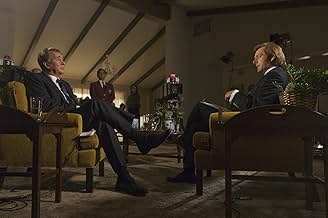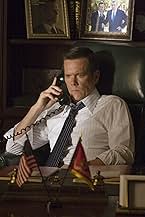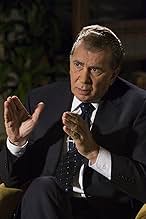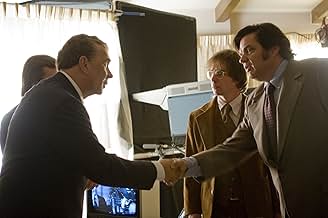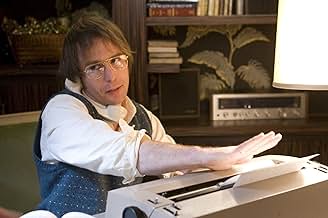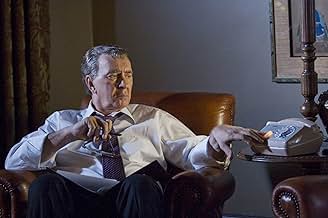A dramatic retelling of the post-Watergate television interviews between British talk-show host David Frost and former president Richard Nixon.A dramatic retelling of the post-Watergate television interviews between British talk-show host David Frost and former president Richard Nixon.A dramatic retelling of the post-Watergate television interviews between British talk-show host David Frost and former president Richard Nixon.
- Nominated for 5 Oscars
- 23 wins & 81 nominations total
Featured reviews
Morgan's source material translates smoothly onto film. Much as he did with "The Queen", he mixes a behind the scenes look at the immediate time period leading up to the historical event and closes with an almost word-for-word dramatization of said event. Also, like "The Queen", we have the excellent Michael Sheen on board, who after playing Tony Blair now takes on the mannerisms of the legendary British talk-show host and man-about-town David Frost. Director Ron Howard nicely interweaves archival news footage, faux-post interviews with the secondary players, and the dramatic reenactments of the actual Frost/Nixon interviews. Howard's studied but pedestrian style of direction lends itself well to this type of docudrama as he allows the actual events to speak for themselves and the fine performances to shine on their own. Though it takes quite awhile to get where it's going, the final interview where Frost takes Nixon head-on about the Watergate cover-up is a payoff well worth the wait.
Of course the most fascinating aspect of the film is Frank Langella's portrayal of a shamed and swollen Richard Nixon. He plays him as a fallen man desperate for an act of contrition but still in too deep with his old trickery and slick ways. His performance, and the way it connects with the audience, is wonderfully layered. On one level, we have an aged actor thought to be well past his prime firing back on all cylinders in a renaissance role that will likely lead to a showering of award nominations. The way the film reduces his performance to that one lingering close-up after being steamrolled by Frost on the last day of the interview leaves a lasting impression. But it also works on another level as it is meant to represent the reduction of Nixon's political life to that one lingering close-up on the television monitor when he realized it's all over for him. The audience members who remember watching the interviews and can picture the actual close-up they saw on their TV screens are now allowed to share a communion with the audience members who weren't even born yet and now only have a memory of Langella's face on the silver screen. In that sense, Langella truly became Nixon, and his performance will not soon be forgotten.
My reluctance had to do with the expectation that it will offer nothing new to somebody who lived through the Watergate years and saw the Frost interviews (although remembering surprisingly little of them).
Ron Howard's film is anything but ho-hum - if anything it's a bit too gussied up to be exciting. There is an element of discernible manipulation of the audience, but mostly it works, and you don't long resist it.
The (relatively) unsung hero of the film besides Howard, Frank Langella's tremendous Nixon, and Michael Sheen's excellent Frost is the screenwriter: once again Peter Morgan (of "The Last King of Scotland" and "The Queen") engages mind and heart, and doesn't let go. Sam Rockwell's James Reston, Jr. and Oliver Platt's Bob Zelnick (Frost's two collaborators) are outstanding, and Kevin Bacon's Nixon-worshipping Jack Brennan is the actor's best work in a long time.
Morgan and Howard manage to make the viewer think constantly of another criminal President without saying or showing anything overt - they just let history, past and present, speak.
I had a strange, uncomfortable thought watching "Frost/Nixon": even if some future film "humanizes" (not excuses) Bush the way Nixon comes through this one, W. would still remain a malevolent midget against Nixon's accomplishments and actual *brain*. How far we have fallen.
The acting duo of Frank Langella & Micheal Sheen (Nixon & Frost) are set on a collision course that finds two deeply passionate personalities at the mercy of their insatiable desires. Both actor's portrayals are a study of affectation and body language, pleasurably accurate and yet not simply an impersonation. Indeed, the film never strays from the distinct Howard format that breathes so much life (read intimacy) into this familiar and yet mysterious relationship that exists for so many people who lived through the exceptional event.
Make no mistake, this is by no means a two man show, quite the contrary. In fact, the wealth of supporting roles is perhaps the finest feature of this production. Bacon's devoted and stalwart marine practically glints of gun metal and polished shoe leather. The trio of Gould, Platt and Rockwell portray effortlessly the roles of the men who, brick by brick, constructed the platform from which Frost so successfully and serendipitously elicited one of the greatest unspoken confessions of all time. Rebecca Hall is delicious and demure, constantly filling scenes with her elegant presence.
Perhaps the richest praise should be reserved for Peter Morgan, who has, without question, penned a truly captivating and insightful story that delivers not only a satisfying comprehension of a complex time in US history, but captures a generation's struggle to come to terms with the frailty of leadership that still echoes today.
Not to be missed, this film can be enjoyed on multiple levels and will undoubtedly be regarded as seminal for it's engrossing insight and expert depiction.
It's important that the fakery should work well, because the movie must provide lots of closeups that those in the balcony didn't see. So long as it works, the feeling of TV interviews is better achieved in the film, and the actors don't have to yell. The camera, sometimes annoyingly jerky, but in the best moments simply direct and relentless, does their yelling for them.
So I'm saying this is a winner. Peter Morgan after all did the screenplay, and he's no stranger to such efforts--notable examples of his film writing are in The Last King of Scotland and The Queen; a rather less notable one is The Other Boleyn Girl. The flaws are simply in the events. For three of the interview parts, till it gets to Watergate in the fourth, Nixon seems to be winning. Despite a dramatic intervention by Nixon support staffer Col Jack Brennan (Kevin Bacon) to prevent an abject breakdown, Nixon does buckle under in part four. But his admissions still remain in the realm of generality, and there is the question: does anything said on TV really matter? The audience for a West End or Broadway play is a bit different from the popcorn crowd and how appealing this film will be to the mainstream is uncertain. Needless to say it's all talk and minimal action. For students of contemporary American history nonetheless the topic is thrilling. Frost used his own money for down payments. In need of cash and highly mercenary, Nixon used the celebrity agent Swiftie Lazar (Toby Jones) to get $600,000 for the interviews. Frost lost sponsors and the US networks refused to come aboard. He made down payments from his own funds and borrowed. He hired two journalists, Bob Zelnick (Oliver Platt) and James Reston (Sam Rockwell), to do support research. Reston was a firebrand opponent of Nixon. He refused to participate unless there was a commitment to shame Nixon and get him to admit he did wrong in Watergate and betrayed the country's trust.
The issue was whether Frost had the depth to tackle a job like this. He wanted a Watergate confession too, but he let Nicon play him with small talk (despite the man's claim that he was no good at it) and temporize with lengthy self-serving reminiscences that blunted most of Frost's pointed questions. This is where Zelick and especially Reston come in to give a sense of urgency. Again the film excels where the play couldn't in showing Nixon's walk out to his car after each encounter, jubilant at first, pathetic at the end.
Ultimately both in the play and the film, Frost's victory seems a hollow one, of little significance to morality or history. This is above all a story about television. In that arena, this was a coup. and there is great drama in how close Frost's project came to failing. As the encounters got under way, he was losing every sponsor, and later he lost his Australian show, having some time earlier lost his American one. The film tells us they all came back, and then some. Frost never really seems to have reentered the world of American television, but he has had many projects in England and is said now to be "worth £20 million," with a live weekly current affairs program on Al Jazeera English. Nixon is dead, and though he may have won three rounds out of four in the Frost interviews, his legacy is tainted.
The show belongs to Sheen and Langella, but Bacon is excellent as the stiff, loyal Col. Brennan, and Sam Rockwell strong in an unusually serious role for him. As Nixon's somewhat lost wife Pat, the child star of The Bad Seed Patty McCormack is touching. There are lots of other actors, far more than in the stage production, and the best thing is they don't get in the way. San Clemente also plays a significant role. The brightness and beauty of Nixon's ocean-side estate helps dramatize his depression by contrast. There were doubts about putting Howard in charge of the screen version, but they were groundless.
Did you know
- TriviaFrank Langella and Michael Sheen repeated the roles they created on stage. Ron Howard would only agree to direct if the studio would allow both actors to appear in the film version.
- GoofsFrost and Nixon behave as if they've never met before. In real life, Frost interviewed Nixon when he ran for president in 1968. Nixon enjoyed the interview so much that after he was elected, he met with Frost in the White House to discuss producing a television special.
- Quotes
Richard Nixon: That's our tragedy, you and I Mr. Frost. No matter how high we get, they still look down at us.
David Frost: I really don't know what you're talking about.
Richard Nixon: Yes you do. Now come on. No matter how many awards or column inches are written about you, or how high the elected office is, it's still not enough. We still feel like the little man. The loser. They told us we were a hundred times, the smart asses in college, the high ups. The well-born. The people who's respect we really wanted. Really craved. And isn't that why we work so hard now, why we fight for every inch? Scrambling our way up in undignified fashion. If we're honest for a minute, if we reflect privately, just for a moment, if we allow ourselves a glimpse into that shadowy place we call our soul, isn't that why we're here? Now? The two of us. Looking for a way back into the sun. Into the limelight. Back onto the winner's podium. Because we can feel it slipping away. We were headed, both of us, for the dirt. The place the snobs always told us that we'd end up. Face in the dust, humiliated all the more for having tried. So pitifully hard. Well, to *hell with that*! We're not going to let that happen, either of us. We're going to show those bums, we're going to make 'em choke on our continued success. Our continued headlines! Our continued awards! And power! And glory! We are gonna make those mother fuckers *choke*!
- Crazy creditsMichael Sheen and Frank Langella are credited simultaneously before the title. Sheen's name is on a lower level, but further to the left; while Langella's is higher up, but pushed to the right. Therefore, depending on whether you read the card top-to-bottom or left-to-right, either actor can be seen as being credited first.
- ConnectionsFeatured in At the Movies: Summer Special 2008/09 (2008)
- SoundtracksBy George It's David Frost
Written by George Martin (as George Henry Martin)
Performed by Atli Örvarsson
Details
- Release date
- Countries of origin
- Official site
- Language
- Also known as
- Frost/Nixon - La entrevista del escándalo
- Filming locations
- Palos Verdes Estates, California, USA(Nixon "San Clemente" Compound)
- Production companies
- See more company credits at IMDbPro
Box office
- Budget
- $25,000,000 (estimated)
- Gross US & Canada
- $18,622,031
- Opening weekend US & Canada
- $180,708
- Dec 7, 2008
- Gross worldwide
- $27,426,335
- Runtime2 hours 2 minutes
- Color
- Sound mix
- Aspect ratio
- 2.35 : 1
Contribute to this page








